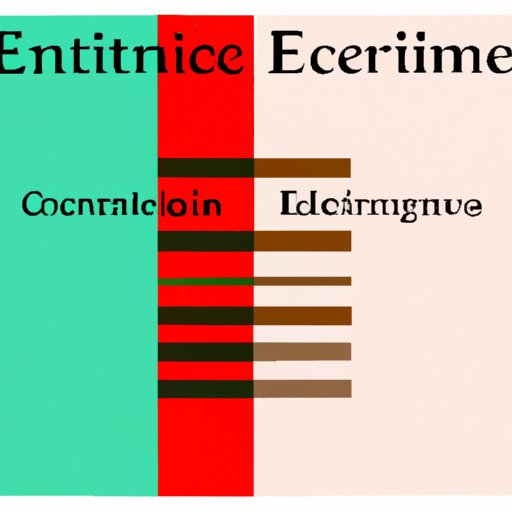Introduction
Ethnocentrism and cultural relativism are two ways of thinking about the world. Although they may seem similar on the surface, there are key differences between the two perspectives. In this article, we will explore what these differences are, as well as their implications for our worldview, values, and social justice.

Comparing and Contrasting Ethnocentrism and Cultural Relativism
Ethnocentrism is the belief that one’s own culture or way of life is superior to others. It is based on the assumption that one’s own culture is the standard by which all other cultures should be judged. This view often leads to an attitude of superiority and intolerance towards those who are different.
Cultural relativism, on the other hand, is the belief that all cultures should be respected and valued equally. This view is based on the idea that no single culture is better than any other, and that all cultures should be seen in the context of their own unique history and circumstances. This perspective emphasizes the importance of understanding and appreciating cultural differences.
The key difference between ethnocentrism and cultural relativism is that the former is based on a belief in the superiority of one’s own culture, while the latter is based on a respect for all cultures. Ethnocentrism can lead to feelings of superiority and intolerance towards those with different beliefs, while cultural relativism encourages understanding and appreciation of cultural diversity.
Exploring the Pros and Cons of Ethnocentrism and Cultural Relativism
Both ethnocentrism and cultural relativism have both positive and negative aspects. Let’s take a look at some of the pros and cons of each perspective.
One of the pros of ethnocentrism is that it can give people a sense of belonging and identity. By believing in the superiority of their own culture, people can feel a strong connection to their heritage and history. This can be beneficial in terms of fostering a sense of national pride and unity.
On the other hand, ethnocentrism can also lead to feelings of intolerance and superiority towards those with different beliefs or lifestyles. This can lead to discrimination and prejudice, which can create divisions and conflict in society. It can also lead to a lack of understanding and appreciation for the cultures of others, which can hinder progress and mutual understanding.
Cultural relativism, on the other hand, has a number of positive aspects. One of the most important is that it encourages understanding and appreciation of cultural differences. By viewing all cultures in their own unique context, people can gain insight into different viewpoints and experiences. This can lead to more open-mindedness and tolerance, as well as greater appreciation for the diversity of humanity.
However, cultural relativism also has its drawbacks. One of the major criticisms is that it can lead to an attitude of “anything goes”, which can make it difficult to address injustice and inequality. Cultural relativism may also lead to a lack of accountability, as it can discourage criticism of certain practices or beliefs.

An Analysis of Ethnocentrism and Cultural Relativism
It is important to examine how ethnocentrism and cultural relativism influence our worldview. Ethnocentrism can lead to a narrow, rigid view of the world, as it encourages people to view their own culture as superior. This can lead to an unwillingness to consider other perspectives or to learn from other cultures.
Cultural relativism, on the other hand, can broaden one’s worldview by encouraging an open-minded attitude towards other cultures. By understanding and appreciating cultural differences, people can gain insight into different perspectives and experiences. This can lead to greater empathy, understanding, and appreciation of diversity.
Examining the Philosophical Differences Between Ethnocentrism and Cultural Relativism
When examining the philosophical differences between ethnocentrism and cultural relativism, it is important to consider the role of values. Ethnocentrism is based on the assumption that one’s own culture is superior, and that other cultures should be judged according to one’s own set of values. This view can lead to an attitude of superiority and intolerance towards those with different beliefs.
Cultural relativism, on the other hand, emphasizes the importance of understanding and appreciating cultural differences. This view is based on the idea that no single culture is better than any other, and that all cultures should be seen in the context of their own unique history and circumstances. This perspective encourages tolerance and respect for cultural diversity.
The power dynamics between cultures also play an important role in determining which perspective is adopted. Ethnocentrism is often adopted by dominant cultures, as it allows them to maintain their power and control over other cultures. Cultural relativism, on the other hand, is often adopted by minority cultures, as it allows them to challenge the status quo and assert their rights.

The Impact of Ethnocentrism and Cultural Relativism on Social Justice
The attitudes and beliefs associated with ethnocentrism and cultural relativism can have a profound impact on social justice. Ethnocentrism can lead to feelings of superiority and intolerance towards those with different beliefs, which can lead to discrimination, prejudice, and inequality. On the other hand, cultural relativism can lead to greater understanding and appreciation of cultural differences, which can help to promote equality and justice.
Conclusion
In conclusion, ethnocentrism and cultural relativism are two distinct ways of thinking about the world. They have different implications for our worldview, values, and social justice. Ethnocentrism can lead to feelings of superiority and intolerance, while cultural relativism encourages understanding and appreciation of cultural differences. Ultimately, it is up to each individual to decide which perspective they choose to adopt.
(Note: Is this article not meeting your expectations? Do you have knowledge or insights to share? Unlock new opportunities and expand your reach by joining our authors team. Click Registration to join us and share your expertise with our readers.)
